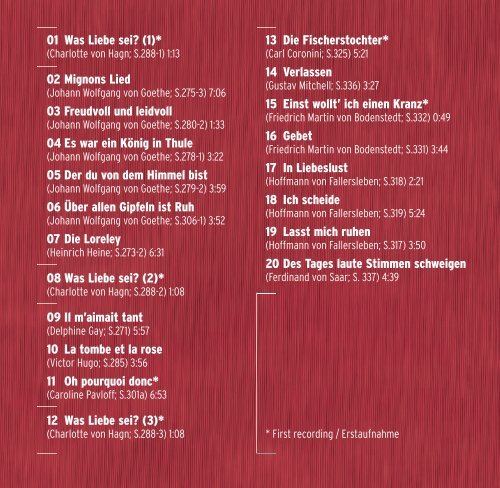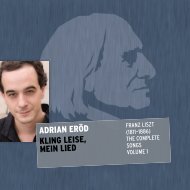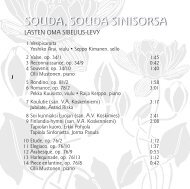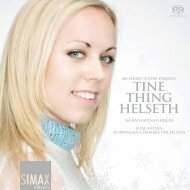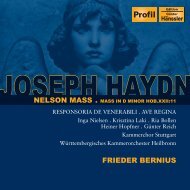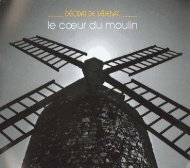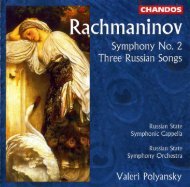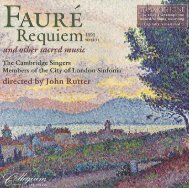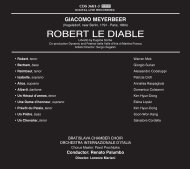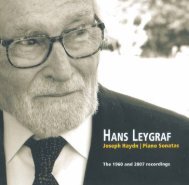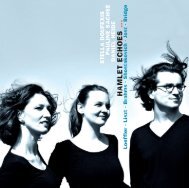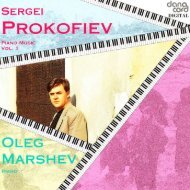01 was Liebe sei? (1)* 02 mignons Lied 03 Freudvoll und leidvoll 04 ...
01 was Liebe sei? (1)* 02 mignons Lied 03 Freudvoll und leidvoll 04 ...
01 was Liebe sei? (1)* 02 mignons Lied 03 Freudvoll und leidvoll 04 ...
Sie wollen auch ein ePaper? Erhöhen Sie die Reichweite Ihrer Titel.
YUMPU macht aus Druck-PDFs automatisch weboptimierte ePaper, die Google liebt.
<strong>01</strong> <strong>was</strong> <strong>Liebe</strong> <strong>sei</strong> (1)*<br />
(Charlotte von Hagn; S.288-1) 1:13<br />
<strong>02</strong> <strong>mignons</strong> <strong>Lied</strong><br />
(Johann Wolfgang von Goethe; S.275-3) 7:06<br />
<strong>03</strong> <strong>Freudvoll</strong> <strong>und</strong> <strong>leidvoll</strong><br />
(Johann Wolfgang von Goethe; S.280-2) 1:33<br />
<strong>04</strong> Es war ein König in Thule<br />
(Johann Wolfgang von Goethe; S.278-1) 3:22<br />
05 Der du von dem Himmel bist<br />
(Johann Wolfgang von Goethe; S.279-2) 3:59<br />
06 Über allen Gipfeln ist Ruh<br />
(Johann Wolfgang von Goethe; S.306-1) 3:52<br />
07 Die Loreley<br />
(Heinrich Heine; S.273-2) 6:31<br />
08 <strong>was</strong> <strong>Liebe</strong> <strong>sei</strong> (2)*<br />
(Charlotte von Hagn; S.288-2) 1:08<br />
13 Die Fischerstochter*<br />
(Carl Coronini; S.325) 5:21<br />
14 Verlassen<br />
(Gustav Mitchell; S.336) 3:27<br />
15 Einst wollt’ ich einen Kranz*<br />
(Friedrich Martin von Bodenstedt; S.332) 0:49<br />
16 Gebet<br />
(Friedrich Martin von Bodenstedt; S.331) 3:44<br />
17 In <strong>Liebe</strong>slust<br />
(Hoffmann von Fallersleben; S.318) 2:21<br />
18 Ich scheide<br />
(Hoffmann von Fallersleben; S.319) 5:24<br />
19 Lasst mich ruhen<br />
(Hoffmann von Fallersleben; S.317) 3:50<br />
20 Des Tages laute Stimmen schweigen<br />
(Ferdinand von Saar; S. 337) 4:39<br />
09 Il m’aimait tant<br />
(Delphine Gay; S.271) 5:57<br />
10 La tombe et la rose<br />
(Victor Hugo; S.285) 3:56<br />
11 Oh pourquoi donc*<br />
(Caroline Pavloff; S.3<strong>01</strong>a) 6:53<br />
12 <strong>was</strong> <strong>Liebe</strong> <strong>sei</strong> (3)*<br />
(Charlotte von Hagn; S.288-3) 1:08<br />
* First recording / Erstaufnahme
FRANZ LISZT<br />
In view of the forthcoming 200th birthday of Franz Liszt in 2<strong>01</strong>1, the participants in the Liszt <strong>Lied</strong> Edition<br />
consider it necessary to ensure that the composer’s <strong>Lied</strong>er sets are given their due place in the canon.<br />
In order to give both listeners and active musicians unrestricted access to Liszt’s <strong>Lied</strong> repertoire, we<br />
also intend to make available previously unpublished works and to present recording premiers.<br />
While Liszt’s instrumental pieces in their totality may certainly be difficult to comprehend and appreciate,<br />
this is true even more so for his <strong>Lied</strong>er sets and his religious vocal compositions: even today, Liszt’s<br />
reputation too often is considered to be that of an<br />
important virtuoso pianist and creator of monumental<br />
symphonic epics.<br />
In fact, however, Liszt’s <strong>Lied</strong>er contain the essence<br />
of his entire oeuvre and cannot be ignored in examining<br />
the developmental process of this composer.<br />
Many of his musical ideas sprang originally from<br />
the <strong>Lied</strong> repertoire, since song can be the simplest<br />
expression of programmatic thinking as well as part<br />
of a dramatic treatment. The <strong>Lied</strong>er are often the<br />
direct expression of the composer’s personality and<br />
touch upon all aspects of his life – from casual<br />
songs to those that disclose Liszt’s most inner feelings<br />
as an artist, a person, a devout Catholic, and a<br />
patriot.<br />
The different versions of individual works reflect<br />
not only the artist’s personal development but also<br />
Franz Liszt um 1835<br />
that of his compositions as well. The unique aspect<br />
of the <strong>Lied</strong> repertoire thus lies in the diversity
THE SONG<br />
„The new artistic ideal proclaimed by Liszt <strong>was</strong> aimed at a synthesis of music and poetry, at a new<br />
musical language having ‚expressive certainty‘ as one of its core precepts, and not least at a new perspective<br />
on the genre,“ wrote Detlef Altenburg with respect to the phenomenon of the so-called New<br />
German School. 1 Indeed: During his Weimar period, Liszt sought to unify music and literature in an<br />
unconventional manner – <strong>und</strong>er the framework of a new genre of symphonic epic. As he himself (or<br />
perhaps his famulus) put it: „Music has been connected with literary or quasi-literary works through<br />
the sung word since time immemorial; now, the goal is to unify the two in a manner more intimate<br />
than has thus far been the case. Music is increasingly assimilating the masterpieces of literature in its<br />
own masterpieces.“ 2<br />
In the songs of Franz Schubert, Liszt could find examples of a novel, intimate nexus between poetry<br />
and music; and find them he did, as is made evident by the virtuoso pianist‘s numerous Schubert transcriptions.<br />
3 With a symphonic epic, however, the nature of the relationship between music and literature<br />
is different than with a song or an opera: It does not involve the mere scoring of a presented text,<br />
as is the case in the latter two instances. This makes it all the more surprising that Liszt, the composer<br />
of programmatic instrumental pieces, wrote so many songs, i.e., provided so many examples of the<br />
more traditional coupling of music and literature. But do Liszt‘s <strong>Lied</strong>er serve to document his literary<br />
interests And are they „true“ songs<br />
Although Liszt scored poems of high literary repute (e.g., poems by Goethe, Schiller, Heine, Hugo or<br />
Petrarch), it is striking how many of the texts he chose to score are NOT literary masterpieces. Many<br />
of his <strong>Lied</strong>er are chance compositions: The lyrics to „Was <strong>Liebe</strong> <strong>sei</strong>,“ for instance, came from the celebrated<br />
actress Charlotte von Hagn, with whom Liszt had an intimate relationship in the early 1840s.<br />
It should also be pointed out that Liszt‘s vocal compositions – with respect to the manner in which<br />
they have been scored – often do not fit well within the genre of song but rather within that of opera.<br />
Pieces that have repetitive lyrics and operatic codas, such as „Die Loreley“ or „Kennst du das Land,“<br />
are representative of the type of aria in which „music ... is merely a vehicle for an otherwise largely
Aux accents du rossignol<br />
Sous la floraison pleinement<br />
épnouie de la frondaison.<br />
Longuement!<br />
20 Des Tages laute<br />
Stimmen schweigen<br />
(Ferdinand von Saar)<br />
Des Tages laute Stimmen<br />
schweigen,<br />
Und dunkeln will es allgemach,<br />
Ein letztes Schimmern<br />
in den Zweigen,<br />
Dann zieht auch dies<br />
der Sonne nach.<br />
Noch leuchten ihre Purpurgluten<br />
Um jene Höhen, kahl <strong>und</strong> fern,<br />
Doch in des Äthers klaren Fluten<br />
Erzittert schon ein blasser Stern.<br />
Ihr müden Seelen rings im Kreise,<br />
So ist euch wieder Ruh gebracht;<br />
Aufatmen hör ich euch noch leise,<br />
Dann küsst euch still<br />
<strong>und</strong> mild die Nacht.<br />
The day‘s loud voices fall silent,<br />
And darkness gradually spreads;<br />
A last shimmer in the branches,<br />
Then this too follows the sun.<br />
Its purple glow still illumines<br />
Those heights, bare and distant,<br />
Yet in the clear ocean of space<br />
Already a pale star trembles.<br />
Ye weary souls all aro<strong>und</strong>,<br />
Thus is peace brought<br />
to you again;<br />
I hear you still breathing soft<br />
and deep,<br />
Then night kisses you quietly<br />
and gently<br />
Les voix bruyantes du jour<br />
se taisent<br />
Et peu à peu la nuit tombe,<br />
Une derniére lueur dans les<br />
frondaisons<br />
Puis celle-ci se retire aussi<br />
dans le sillage du soleil.<br />
Ses rayons de pourpre<br />
resplendissent encore<br />
Autour de ces cimes dépouillées<br />
et lointaines,<br />
Mais dans les claires ondes<br />
de l‘éther<br />
Tremble déjà une pâle étoile.<br />
A vous, âmes lasses tout alentour,<br />
Le rpos est ainsi rendu,<br />
Je vous entends encore<br />
respirer tout bas,<br />
Puis la nuit appose sur vous<br />
son silencieux et doux baiser.
Janina Baechle And Charles Spencer<br />
After a few years only Janina Baechle has become one of the great mezzo-sopranos of our time. Born<br />
in Hamburg, she studied musicology and history in her home town. Simultaneously she took singing<br />
lessons with Gisela Litz and later finished her vocal education with Brigitte Fassbaender. Her first public<br />
performance <strong>was</strong> in 1997. Since 20<strong>04</strong> she is a member of the Vienna State Opera, indispensable in<br />
the roles of Ortrud, Brangäne and Quickly. On other opera stages she could be seen and heard as the<br />
nurse in „The Woman Without a Shadow“ or Amneris in „Aida“, the last being her most frequently<br />
sung part. However, Janina Baechle has always had a strong inclination to do concerts. In recent<br />
years, the Vienna Philharmonic Orchestra have invited her to sing in Mahler‘s 2nd Symphony (<strong>und</strong>er<br />
Seiji Ozawa) and „The Song of the Earth“ (<strong>und</strong>er Kent Nagano). Many listeners were surprised to hear<br />
that this voice, fit for the great Wagner parts, <strong>was</strong> also able to master a most tender pianissimo. Tiana<br />
Lemnitz <strong>was</strong> also known for her „piano“ singing once (she <strong>was</strong> called „Piana“ in Berlin), yet she „<strong>was</strong>“<br />
Elsa, not Ortrud. Since graduation Janina Baechle has been touring from recital to recital presenting<br />
the most astonishing programs – in German, English, French, Italian or Russian. Of course she feels<br />
comfortable with Brahms, Wolf and Mahler whom she appreciates in particular. At present she feels<br />
also a strong affinity to the French repertoire and the French language which she speaks better than<br />
most people in France. An important moment in her life <strong>was</strong> when she met Charles Spencer, the<br />
favorite accompanist of singer Christa Ludwig most of whose parts at the State Opera were passed on<br />
to Janina. Born in England, Charles Spencer has studied in London and Vienna. He <strong>was</strong> Christa Ludwig‘s<br />
accompanist for 12 years until her good-bye tour in 1993. He also worked with June Anderson,<br />
G<strong>und</strong>ula Janowitz, Marjana Lipovsek, Jessye Norman and Thomas Quasthoff.
Doubt shall shy away<br />
from my breast,<br />
leave it like a burden does.<br />
Anew I weep, anew I live,<br />
I start to feel so light.<br />
17 In <strong>Liebe</strong>slust<br />
(Hoffmann von Fallersleben)<br />
In <strong>Liebe</strong>slust, in Sehnsuchtsqual,<br />
O höre mich!<br />
Eins sing‘ ich nur viel tausendmal<br />
Und nur für dich!<br />
Ich sing es laut durch Wald<br />
<strong>und</strong> Feld,<br />
O höre mich!<br />
Ich sing es durch die ganze Welt:<br />
Ich liebe dich!<br />
Und träumend noch in stiller Nacht<br />
Muss singen ich,<br />
Ich singe, wenn mein Aug‘ erwacht:<br />
Ich liebe dich!<br />
Und wenn mein Herz<br />
im Tode bricht,<br />
O sähst du mich!<br />
Du sähst, dass noch<br />
mein Auge spricht:<br />
Ich liebe dich!<br />
In love’s delight and torments<br />
of loving,<br />
Oh, listen to me!<br />
One song I sing a thousand times<br />
and only for you<br />
I sing it aloud through forest<br />
and fields,<br />
Oh, listen to me!<br />
I sing it throughout<br />
the whole world:<br />
I love you!<br />
And dreaming through<br />
the quiet night<br />
I have to sing,<br />
I sing when my eyes open:<br />
I love you!<br />
And when my heart breaks death,<br />
Oh, look at me!<br />
You see that my eyes still speak:<br />
I love you!<br />
Dans l‘ivresse de l‘amour, dans le<br />
tourmant du désir,<br />
O! écoute-moi!<br />
Il y a quelque chose que je ne<br />
chante que des milliers et des<br />
milliers de fois<br />
Et que pour toi seule!<br />
Je le clame bien haut à travers les<br />
bois et les champs,<br />
O! écoute-moi!<br />
Je le chante à travers le monde<br />
entier:<br />
Je t‘aime!<br />
Et rêvant encore dans la nuit<br />
silencieuse<br />
il me faut chanter,<br />
Je chante dès que mon œil<br />
s‘éveille:<br />
Je t‘aime!<br />
Et lorsque mon cœur s‘anéantira<br />
dans la mort,<br />
O! puisses-tu alors me voir!<br />
Tu verrais que mes yeux te disent<br />
encore:<br />
Je t‘aime!<br />
18 Ich scheide<br />
(Hoffmann von Fallersleben)<br />
Die duftenden Kräuter auf der Au‘<br />
der Halm im frischen Morgenthau<br />
die Bäum‘ im grünen Kleide,<br />
ein jedes ruft: ich scheide,<br />
leb‘ wohl, ich scheide.<br />
Die Rosen in ihrer frischen Pracht,<br />
die Lilien in ihrer Engelstracht,<br />
die Blümchen auf der Heide,<br />
ein jedes ruft: ich scheide!<br />
leb‘ wohl, ich scheide!<br />
Ist Alles nur ein Kommen<br />
<strong>und</strong> Gehen,<br />
ein Scheiden mehr als Wiedersehn,<br />
wir freu‘n uns, hoffen <strong>und</strong> leiden
FRANZ LISZT<br />
Anlässlich des 200. Geburtstags von Franz Liszt im Jahr 2<strong>01</strong>1 ist es den Beteiligten der Liszt-<strong>Lied</strong>-Edition<br />
ein Bedürfnis, dem <strong>Lied</strong>schaffen des Komponisten den ihm gebührenden Platz in der Rezeption zu<br />
sichern. Um sowohl dem Hörer als auch dem aktiven Musiker einen uneingeschränkten Zugang zu Liszts<br />
<strong>Lied</strong>repertoire zu ermöglichen, wollen wir auch unveröffentlichte Werke publizieren <strong>und</strong> <strong>Lied</strong>er in<br />
Ersteinspielung präsentieren.<br />
Ist das Instrumentalwerk Liszts in <strong>sei</strong>ner Gesamtheit bereits nur schwer zu erfassen <strong>und</strong> zu erfahren, so<br />
gilt das noch in viel größerem Maße für <strong>sei</strong>n <strong>Lied</strong>schaffen <strong>und</strong> <strong>sei</strong>ne geistlichen Vokalkompositionen: Zu<br />
sehr eilt Liszt immer noch <strong>sei</strong>n Ruf als bedeutender Klaviervirtuose<br />
<strong>und</strong> als Schöpfer gigantischer Symphonischer Dichtungen<br />
voraus.<br />
Franz Liszt im März 1886<br />
Tatsächlich aber tragen Liszts <strong>Lied</strong>er <strong>sei</strong>nen gesamten Schaffenskosmos<br />
auf besondere Weise mit <strong>und</strong> sind aus dem Entwicklungsprozess<br />
dieses Komponisten nicht wegzudenken.<br />
Viele <strong>sei</strong>ner musikalischen Ideen stammen ursprünglich aus<br />
dem <strong>Lied</strong>repertoire. Denn das <strong>Lied</strong> kann der einfachste Ausdruck<br />
eines programmatischen Gedankens <strong>sei</strong>n oder Teil einer<br />
dramatischen Handlung. Die <strong>Lied</strong>er sind oft der unmittelbare<br />
Ausdruck der Persönlichkeit des Komponisten <strong>und</strong> berühren<br />
alle Bereiche <strong>sei</strong>nes Lebens – das reicht vom Gelegenheitslied<br />
bis hin zu den <strong>Lied</strong>ern, die Liszts innere Befindlichkeit als Künstler,<br />
Mensch, gläubiger Katholik <strong>und</strong> Patriot verraten.<br />
Die verschiedenen Fassungen der einzelnen Werke spiegeln<br />
aber nicht nur die persönliche, sondern auch die kompositorische<br />
Entwicklung des Künstlers wider. Das Besondere des<br />
<strong>Lied</strong>repertoires liegt daher in der Verschiedenheit, aus wel-
Oh! why if on their roads<br />
The sweet joys are not missing,<br />
why then do all of them cry,<br />
Those poor women here on earth<br />
Do not throw on this mystery<br />
Your disdain, cold and cruel,<br />
And just for the laughter<br />
of the earth<br />
Do not sneer at the tears<br />
from heaven.<br />
13 Die Fischerstochter<br />
(Carl Coronini)<br />
Die Fischerstochter<br />
sitzt am Strand,<br />
es liegt das Netz ihr in der Hand,<br />
der Blick schweift hin ins Weite.<br />
„O Schwalbe, ziehe,<br />
zieh‘ geschwind,<br />
du bist ja schneller als der Wind,<br />
geleite ihn, geleite.“<br />
Der Schiffsjung‘<br />
steht am Mast gelehnt,<br />
<strong>sei</strong>n Herze schlägt,<br />
<strong>sei</strong>n Herze sehnt<br />
sich an das Land zurücke;<br />
<strong>und</strong> eine helle Träne hängt,<br />
vom bittern Herzeleid getränkt,<br />
an <strong>sei</strong>nem trüben Blicke.<br />
„O treue Möwe, eil‘ zu ihr,<br />
erzähl‘, erzähle ihr von mir,<br />
ihr <strong>sei</strong>d ja schnell wie Blitze.<br />
Sag‘ ihr, ich <strong>sei</strong> in Gottes Hand,<br />
<strong>und</strong> baue dir ein Nest am Strand.<br />
Bewahre sie, bewahre.“<br />
Am Himmel eine Wolke zog,<br />
die Schwalbe schoß, die Möwe flog,<br />
den Auftrag zu bestellen.<br />
Die Wolke wurde zum Orkan,<br />
das Schiff verschlang der Ozean,<br />
Erzählt es nicht, ihr Wellen!<br />
Doch <strong>was</strong> die Welle nicht erzählt,<br />
das bleibt ihr ewig nicht verhehlt,<br />
die Ahnung hat gesprochen.<br />
Und wenn das Auge tränenleer,<br />
dann wird das Leben gar zu schwer,<br />
das Herze ist gebrochen.<br />
The fisher’s daughter<br />
sits on the beach,<br />
holding the net in her hand,<br />
her look roaming into the distance.<br />
“Oh, swallow, fly! Fly quickly<br />
for you are faster than the wind,<br />
escort him, do escort!”<br />
The ship’s boy leans<br />
against the mast<br />
his heart beats heavily,<br />
longing back to the land.<br />
Watered by a bitter pain<br />
in his heart,<br />
a pale tear hangs<br />
in his gloomy look.<br />
“Oh, true seagull, hurry,<br />
tell, tell her about me<br />
for you are fast like lighnings are.<br />
Tell her that I’m in God’s own hand,<br />
then build a nest on the beach<br />
and guard her, guard her!”<br />
A cloud moved in the sky,<br />
the swallow rushed,<br />
the seagull flew<br />
to fulfill their orders.<br />
The cloud grew into a storm,<br />
and the sea engulfed the ship.<br />
Don’t tell it, waves!<br />
Although not told by the wave,<br />
it remained no secret to her<br />
when she listened to her feeling.<br />
If the eye has no tears<br />
life gets too hard.<br />
Her heart is broken.
DAS LIED<br />
Das von Liszt „proklamierte neue Kunstideal zielte auf eine Synthese von Musik <strong>und</strong> Dichtung, auf eine<br />
neue Musiksprache, für die eine der obersten Maximen die ,sprechende Bestimmtheit‘ ist, <strong>und</strong> nicht zuletzt<br />
ein neues Gattungsdenken“, schreibt Detlef Altenburg im Zusammenhang mit dem Phänomen der so<br />
genannten „Neudeutschen Schule“. 1 Wahrhaftig: Liszt wollte während <strong>sei</strong>ner Weimar-Periode Musik <strong>und</strong><br />
Literatur in einer unkonventionellen Weise vereinigen: im Rahmen einer neuen Gattung der symphonischen<br />
Dichtung. Wie er selbst (oder vielleicht <strong>sei</strong>n Famulus) es formulierte: „Durch das gesungene Wort<br />
hat von jeher eine Verbindung der Musik mit literarischen oder quasi literarischen Werken bestanden;<br />
gegenwärtig wird nun eine Vereinigung Beider erstrebt, die eine innigere zu werden verspricht, als sie<br />
bis jetzt vorgekommen. Die Musik nimmt in ihren Meisterwerken mehr <strong>und</strong> mehr die Meisterwerke der<br />
Literatur in sich auf.“ 2<br />
Beispiele für eine neuartige, innige Verbindung von Dichtung <strong>und</strong> Musik konnte Liszt in den <strong>Lied</strong>ern von<br />
Franz Schubert finden; <strong>und</strong> er hat sie auch gef<strong>und</strong>en, wie die zahlreichen Schubert-Transkriptionen des<br />
Klaviervirtuosen zeigen. 3 Die Beziehung von Musik <strong>und</strong> Literatur ist aber in einer symphonischen Dichtung<br />
von anderer Art als in einem <strong>Lied</strong> oder einer Oper: Es handelt sich nicht um die bloße Vertonung einer<br />
gegebenen Textvorlage wie in den letzteren Fällen. Da ist es um so mehr überraschend, dass Liszt, der<br />
Komponist programmatischer Instrumentalwerke, so viele <strong>Lied</strong>er in Musik setzte, das heißt, so viele Beispiele<br />
für die traditionellere Verbindung von Musik <strong>und</strong> Literatur lieferte. Sind aber die Lisztschen <strong>Lied</strong>er<br />
Dokumente <strong>sei</strong>ner literarischer Interessen Und sind sie „wahre“ <strong>Lied</strong>er<br />
Obwohl Liszt auch Gedichte von hohem literarischem Wert vertonte (z.B. Dichtungen von Goethe, Schiller,<br />
Heine, Hugo oder Petrarca), ist es auffallend, wie oft die von ihm zur Vertonung ausgewählten Texte NICHT<br />
zu den Meisterwerken der Literatur gehören. Viele <strong>sei</strong>ner <strong>Lied</strong>er sind Gelegenheitskompositionen: Der Text<br />
von „Was <strong>Liebe</strong> <strong>sei</strong>“ stammt z.B. von der gefeierten Schauspielerin Charlotte von Hagn, zu der Liszt Anfang<br />
der 1840er-Jahre eine innige Bekanntschaft pflegte.<br />
Es muss auch bemerkt werden, dass die Lisztsche Vokalkompositionen – <strong>was</strong> die Art <strong>und</strong> Weise der Vertonung<br />
betrifft – oft nicht der Gattung <strong>Lied</strong>, sondern eher der Oper nahestehen. Werke mit vielen Textwieder-
Dans la lueur du soleil couchant.<br />
La plus belle des filles est assise<br />
Là-haut, splendide,<br />
Ses bijoux d‘or flamboient,<br />
Elle peigne ses cheveux d‘or.<br />
Elle les coiffe avec un peigne d‘or<br />
Tout en chantant une chanson<br />
Qui possède une étrange<br />
Et violente mélodie.<br />
Le batelier dans son petit esquif<br />
En est étreint d‘une douleur<br />
sauvage,<br />
Il ne regarde pas le récif,<br />
Il ne regarde que vers les hauteurs.<br />
Je crois qu‘à la fin les vagues<br />
Ont englouti le batelier et sa<br />
barque;<br />
Et c‘est avec son chant<br />
Que l‘a fait la Lorelei.<br />
09 Il m‘aimait tant<br />
(Delphine Gay)<br />
Non, je ne l‘aimes pas;<br />
mais de bonheur émue,<br />
Ma sœur, je me sentais rougir<br />
en l‘écoutant;<br />
Je fuyais son regard,<br />
je tremblais à sa vue:<br />
Il m‘aimait tant!<br />
Je me parais pour lui,<br />
car je savais lui plaire;<br />
Pour lui, j‘ai mis ces fleurs<br />
et ce voile flottant:<br />
Je ne parlais qu‘à lui,<br />
je craignais sa colère:<br />
Il m‘aimait tant!<br />
Mais un soir il me dit:<br />
„Dans la sombre vallée<br />
Viendrez-vous avec moi“<br />
Je le promis... pourtant,<br />
En vain il m‘attendit;<br />
je n‘y suis pas allée...<br />
Il m‘aimait tant!<br />
Alors il a quitté<br />
ma joyeuse demeure.<br />
Malheureux!<br />
il a dû me maudire en partant;<br />
Je ne le verrai plus!<br />
je suis triste, je pleure:<br />
Il m‘aimait tant!<br />
Nein, ich liebte ihn nicht!<br />
Bei <strong>sei</strong>nes Werbens Drange<br />
Erglühten wohl die Wangen mir,<br />
doch war das Herz mir schwer<br />
Ich floh vor <strong>sei</strong>nem Blick,<br />
mir ward so ängstlich bange<br />
Er liebte mich so sehr<br />
Ich schmückte mich für ihn,<br />
ihm wollt ich gern gefallen;<br />
mit Blumen schmückte ich mir<br />
die Locken, die Brust.<br />
Ich sprach allein mit ihm,<br />
<strong>und</strong> bebte trotz dem Allen.<br />
Er liebte mich so sehr!<br />
Doch einst sprach er zu mir:<br />
„In den traulichen Garten<br />
Wirst du doch mit mir gehn“<br />
Ich sagte zu <strong>und</strong> brach mein Wort;<br />
Er ging umsonst dahin,<br />
ich ließ den Armen warten.<br />
Er liebte mich so sehr!<br />
Drauf hat er dieses Haus,<br />
meine Nähe gemieden;<br />
Wehe mir! ach, er hat mich<br />
verwünscht, als er ging!<br />
Ich werd ihn nie mehr sehn!<br />
ich bin traurig <strong>und</strong> weine:<br />
Er liebte mich so sehr!<br />
No, I didn’t adore him!<br />
Due to his urging suiting<br />
My cheeks glowed,<br />
still my heart <strong>was</strong> heavy<br />
I escaped his gaze,<br />
timidly trembling.<br />
He did love me so much.<br />
Adorning myself for him,<br />
I wished to appeal to him,<br />
Adorning my curls,<br />
my chest with flowers,
Janina Baechle <strong>und</strong> Charles Spencer<br />
Innerhalb von wenigen Jahren wurde Janina Baechle zu einer der großen Mezzosopranistinnen unserer<br />
Zeit. In Hamburg geboren, studierte sie dort Musikwissenschaft <strong>und</strong> Geschichte. Parallel dazu<br />
nahm sie bei Gisela Litz Gesangunterricht. Später vervollständigte sie ihre Ausbildung bei Brigitte<br />
Fassbaender. Ihren ersten Auftritt hatte sie 1997. Seit 20<strong>04</strong> ist sie Mitglied der Wiener Staatsoper <strong>und</strong><br />
wurde dort zur unentbehrlichen Ortrud, Brangäne oder Quickly. Auf anderen Bühnen hat sie ihrem<br />
Repertoire die Rollen der Amme aus Frau ohne Schatten oder der Amneris aus Aida hinzugefügt,<br />
wobei letztere ihre meistgesungene Rolle ist. Janina Baechle fühlte sich jedoch schon immer zum<br />
Konzert hingezogen. In den letzten Jahren haben ihr die Wiener Philharmoniker die Zweite Symphonie<br />
von Gustav Mahler (unter der Leitung von Seiji Ozawa) <strong>und</strong> das <strong>Lied</strong> von der Erde (unter der Leitung<br />
von Kent Nagano) anvertraut. Viele hörten mit Erstaunen, dass sich diese auf die großen Wagner-Rollen<br />
zugeschnittene Stimme auch für das zarteste pianissimo eignet. Tiana Lemnitz war auch für ihr<br />
piano bekannt – <strong>und</strong> Berlin nannte sie Piana –, sie war jedoch eine Elsa, keine Ortrud. Seit dem<br />
Abschluss ihres Musikstudiums reist Janina Baechle von Konzert zu Konzert <strong>und</strong> trägt dabei das<br />
erstaunlichste Repertoire vor, <strong>sei</strong> es auf Deutsch, Englisch, Französisch, Italienisch oder Russisch.<br />
Selbstverständlich fühlt sie sich wohl bei Brahms, Wolf <strong>und</strong> dem von ihr besonders geschätzten<br />
Mahler. Derzeit spürt sie jedoch eine tiefe Verwandtschaft mit dem französischen Repertoire <strong>und</strong> der<br />
französischen Sprache, die sie besser spricht als die meisten Franzosen. Ein wichtiger Moment war<br />
ihre Begegnung mit Charles Spencer, dem bevorzugten Begleiter von Christa Ludwig, von der Janina<br />
Baechle die meisten Rollen an der Staatsoper übernommen hat. Der in England geborene Charles<br />
Spencer studierte in London <strong>und</strong> Wien. Er begleitete Christa Ludwig zwölf Jahre lang, bis zu ihrer<br />
Abschiedstournee 1993. Er arbeitete auch mit June Anderson, G<strong>und</strong>ula Janowitz, Marjana Lipovsek,<br />
Jessye Norman <strong>und</strong> Thomas Quasthoff zusammen.
There <strong>was</strong> a King of Thule,<br />
faithful to the grave,<br />
to whom his dying beloved<br />
gave a golden goblet.<br />
Nothing <strong>was</strong> more valuable to him:<br />
he drained it in every feast;<br />
and his eyes would overflow<br />
whenever he drank from it.<br />
And when he neared death,<br />
he counted the cities of his realm<br />
and left everything gladly<br />
to his heir –<br />
except for the goblet.<br />
He sat at his kingly feast,<br />
his knights about him,<br />
in the lofty hall of ancestors,<br />
there in the castle by the sea.<br />
There, the old wine-lover stood,<br />
took a last draught of life‘s fire,<br />
and hurled the sacred goblet<br />
down into the waters.<br />
He watched it plunge, fill up,<br />
and sink deep into the sea.<br />
His eyes then sank closed<br />
and he drank not one drop more.<br />
Autre fois un Roi de Thulé<br />
Qui jusqu‘au tombeau fut fidèle<br />
Reçut à la mort de sa belle<br />
Une coupe d‘or viselé;<br />
Comme elle ne le quittait guères<br />
Dans les festins les plus joyeux<br />
Toujours une larme légère<br />
À sa vue humectait ses yeux.<br />
Ce prince à la fin de sa vie<br />
Lègue ses villes et son or,<br />
Excepté la coupe chérie<br />
Qu‘à la main il conserve encor;<br />
Il fait à sa table royale<br />
Asseoir ses Barons et ses Pairs,<br />
Au milieu d‘une antique Salle<br />
D‘un Château que baignaient l<br />
es mers.<br />
Le buveur se lève et s‘avance<br />
Auprès d‘un vieux balcon doré,<br />
Il boit et soudain sa main lance<br />
Dans les flots le Vase sacré;<br />
Il tombe tourne l‘eau bouillonne<br />
Puis se calme bientôt après,<br />
Le vieillard pâlit et frissonne,<br />
Il ne boira plus désormais.<br />
05 Der du von dem<br />
Himmel bist<br />
(Goethe)<br />
Der du von dem Himmel bist,<br />
Alles Leid <strong>und</strong> Schmerzen stillest,<br />
Den, der doppelt elend ist,<br />
Doppelt mit Erquickung füllest,<br />
Ach! ich bin des Treibens müde!<br />
Was soll all der Schmerz <strong>und</strong> Lust<br />
Süßer Friede,<br />
Komm, ach komm in meine Brust!<br />
Thou who comest from on high,<br />
Who all woes and sorrows stillest,<br />
Who, for twofold misery,<br />
Hearts with twofold balsam fillest,<br />
Would this constant strife<br />
would cease!<br />
What are pain and rapture now<br />
Blissful Peace,<br />
To my bosom hasten thou!<br />
Toi qui es du ciel,<br />
Tu calmes peines et souffrances,<br />
Celui qui est deux fois plus<br />
misérable,<br />
Tu le réconfortes doublement,<br />
Ah, je suis fatigué de courir!<br />
Pour quoi tous ces tourments<br />
et plaisirs<br />
Douce paix,<br />
Viens, ah viens en mon coeur!<br />
06 Über allen Gipfeln<br />
ist Ruh<br />
(Goethe)<br />
Über allen Gipfeln<br />
ist Ruh,
<strong>01</strong> Was <strong>Liebe</strong> <strong>sei</strong><br />
(Charlotte von Hagn)<br />
Dichter! <strong>was</strong> <strong>Liebe</strong> <strong>sei</strong>,<br />
mir nicht verhehle!<br />
<strong>Liebe</strong> ist das Atemholen der Seele.<br />
Dichter! <strong>was</strong> ein Kuss <strong>sei</strong>,<br />
du mir verkünde!<br />
Je kürzer er ist,<br />
um so größer die Sünde!<br />
Poet, what love is,<br />
don’t conceal from me:<br />
Love is the breathtaking<br />
of the soul.<br />
Poet, what a kiss is,<br />
proclaim it to me:<br />
The shorter a kiss,<br />
the greater our sin.<br />
<strong>02</strong> Mignons <strong>Lied</strong><br />
(Goethe)<br />
Kennst du das Land,<br />
wo die Zitronen blühn,<br />
Im dunkeln Laub<br />
die Gold-Orangen glühn,<br />
Ein sanfter Wind vom blauen<br />
Himmel weht,<br />
Die Myrthe still <strong>und</strong> hoch<br />
der Lorbeer steht<br />
Kennst du es wohl<br />
Dahin! dahin<br />
Möcht ich mit dir,<br />
o mein Geliebter, ziehn.<br />
Kennst du das Haus<br />
Auf Säulen ruht <strong>sei</strong>n Dach.<br />
Es glänzt der Saal,<br />
es schimmert das Gemach,<br />
Und Marmorbilder stehn<br />
<strong>und</strong> sehn mich an:<br />
Was hat man dir, du armes Kind,<br />
getan<br />
Kennst du es wohl<br />
Dahin! dahin<br />
Möcht ich mit dir,<br />
o mein Beschützer, ziehn.<br />
Kennst du den Berg<br />
<strong>und</strong> <strong>sei</strong>nen Wolkensteg<br />
Das Maultier sucht im Nebel<br />
<strong>sei</strong>nen Weg;<br />
In Höhlen wohnt der Drachen<br />
alte Brut;<br />
Es stürzt der Fels <strong>und</strong> über ihn<br />
die Flut!<br />
Kennst du ihn wohl<br />
Dahin! dahin<br />
Geht unser Weg! O Vater,<br />
laß uns ziehn!<br />
Knowest thou<br />
where the lemon blossom grows,<br />
In foliage dark<br />
the orange golden glows,<br />
A gentle breeze blows<br />
from the azure sky,<br />
Still stands the myrtle,<br />
and the laurel, high<br />
Dost know it well<br />
‘Tis there! ‘Tis there<br />
Would I with thee,<br />
oh my beloved, fare.<br />
Knowest the house,<br />
its roof on columns fine<br />
Its hall glows brightly<br />
and its chambers shine,<br />
And marble figures stand<br />
and gaze at me:<br />
What have they done,<br />
oh wretched child, to thee<br />
Dost know it well<br />
‘Tis there! ‘Tis there<br />
Would I with thee,<br />
oh my protector, fare.<br />
Knowest the mountain<br />
with the misty shrouds<br />
The mule is seeking passage<br />
through the clouds;<br />
In caverns dwells the dragons‘<br />
ancient brood;<br />
The cliff rocks plunge<br />
<strong>und</strong>er the rushing flood!<br />
Dost know it well<br />
‘Tis there! ‘Tis there<br />
Leads our path!<br />
Oh father, let us fare.
MAR-1807 2 LISZT: THE COMPLETE SONGS, VOL. 2 JANINA BAECHLE / CHARLES SPENCER<br />
MAR-1807 2 LISZT: THE COMPLETE SONGS, VOL. 2 JANINA BAECHLE / CHARLES SPENCER<br />
LISZT: THE COMPLETE SONGS, VOL. 2 JANINA BAECHLE / CHARLES SPENCER<br />
MAR-1807 2<br />
LISZT<br />
LIED EDITION<br />
VOL. 2<br />
JANINA BAECHLE MEZZO-SOPRANO<br />
CHARLES SPENCER PIANO<br />
FRANZ LISZT (1811-1886)<br />
<strong>01</strong> Was <strong>Liebe</strong> <strong>sei</strong> (1)*<br />
<strong>02</strong> Mignons <strong>Lied</strong><br />
<strong>03</strong> <strong>Freudvoll</strong> <strong>und</strong> <strong>leidvoll</strong><br />
<strong>04</strong> Es war ein König in Thule<br />
05 Der du von dem Himmel bist<br />
06 Über allen Gipfeln ist Ruh<br />
07 Die Loreley<br />
08 Was <strong>Liebe</strong> <strong>sei</strong> (2)*<br />
09 Il m’amait tant<br />
10 La tombe et la rose<br />
11 Oh pourquoi donc*<br />
12 Was <strong>Liebe</strong> <strong>sei</strong> (3)*<br />
13 Die Fischerstochter*<br />
14 Verlassen*<br />
15 Einst wollt’ ich einen Kranz*<br />
16 Gebet<br />
17 In <strong>Liebe</strong>slust<br />
18 Ich scheide<br />
19 Lasst mich ruhen<br />
20 Des Tages laute Stimmen<br />
schweigen<br />
*First recording / Erstaufnahme<br />
A co-production with ORF<br />
© & P 2009 MARSYAS<br />
Marsyas is a division of ENJA Records.<br />
info@marsyas.biz www.marsyas.biz<br />
Made in Germany. DDD LC 14158<br />
#63757-BIAHCc<br />
MAR-1807 2 DEA 590940700<br />
This multichannel/stereo hybrid<br />
SACD can be played on any<br />
standard compact disc player.


